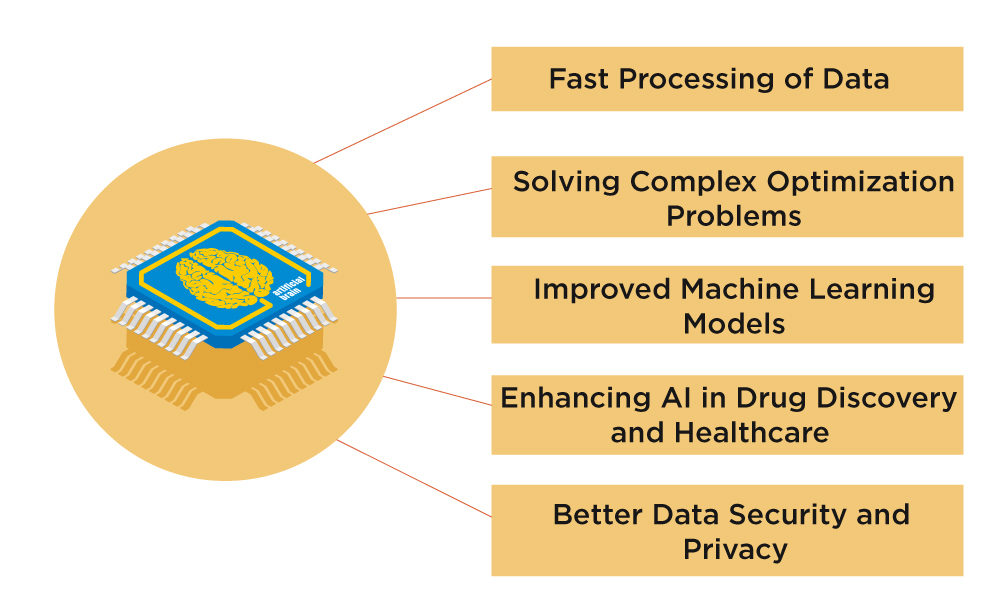In a world where technology changes at incredible speeds, two of the most exciting fields today are quantum computing and artificial intelligence (AI). Where AI is transforming industries from healthcare to entertainment, quantum computing promises to take it to a different dimension. So, let’s explore what quantum computing is and how does it transform AI.
What is Quantum Computing?
To understand how quantum computing is impacting AI, let’s understand what quantum computing is. The traditional computers that we use every day process their information in binary form, that is, in bits that have to be either 0 or 1. These bits are the building blocks in which all of the computer’s data and work tasks are placed.
Quantum computers use quantum bits, commonly called qubits. Qubits are different from traditional bits. There is a major distinction between traditional computers and quantum computers. A single qubit does not have an inherently definite zero or one value, but rather, through the principle of quantum mechanics, it exists in multiple states at the same time.
This ability allows quantum computers to solve any complex problem faster than traditional computers. This unique capability gives them a significant advantage in processing information. Additionally, quantum computers can perform operations by using the phenomenon known as entanglement that forms when qubits connect themselves and exchange with one another instantly, even if they are far apart.
How AI Benefits from Quantum Computing
AI processes large amounts of data, makes informed decisions, and learning patterns. Machine learning, a subset of AI that uses data to “train” models that can make predictions, identify pictures, or even drive vehicles. But traditional computers often fail when dealing with huge databases or when faced with highly complex problems. This is where quantum computing comes in and changes the game.

1. Fast Processing of Data
By using quantum computing Ai is able to process data faster. Quantum computers work much faster with large quantities of data compared to ordinary computers because they can calculate a variety of things simultaneously. This speed allows AI algorithms to be trained in a fraction of the time it would take on a classical computer. For example, training a machine learning model on a large dataset that might take weeks on a traditional supercomputer can take hours or minutes with a quantum computer.
2. Solving Complex Optimization Problems
Optimization problems are crucial in AI. Optimization problems mean finding the best possible solution among many other possible options, like determining the most efficient route for a delivery truck or predicting the best stock investments. Traditional computers cannot find the best answer to a problem with millions of variables. They can process many more possibilities at once, enabling AI systems to solve these types of problems in a much faster and more accurate manner. This could lead to breakthroughs in everything from logistics to financial modeling.
3. Improved Machine Learning Models
Quantum computing is also helping to create more advanced machine learning models in more complex models. Quantum algorithms have the potential to make certain types of machine learning tasks easier. For instance, quantum computers could improve training processes for deep learning networks, making them more accurate by using fewer resources. They could also support more sophisticated models that can understand and process more complex patterns in data.
4. Enhancing AI in Drug Discovery and Healthcare
In healthcare, AI has already shown promise in areas like diagnosing diseases and developing personalized treatment plans. Other discoveries of new drugs or understanding complex biological systems would take years to accomplish while analyzing vast datasets. Quantum computers can simulate molecular structures so much faster than classical computers. This capability enables the AI system to make a faster prediction about which of the drug compounds might be effective for a certain disease, which may accelerate discovering life-saving treatments.
5. Better Data Security and Privacy
One area where AI and quantum computing are expected to play a crucial role is in improving data security. For instance, quantum computers can decrypt encrypted data that would never be cracked by any computer. The more sensitive the information being processed by AI such as personal health data or financial transactions, the more need there is for privacy and security. Quantum-enhanced AI may introduce new methods to protect data from cyber threats.
The Challenges Ahead
The potential of quantum computing to transform AI is enormous, but we are still in the early stages of this technology. Quantum computers are not yet widely available, and there are a number of technical challenges that need to be overcome. For example, quantum systems are extremely sensitive to their environment, and it is difficult to maintain the delicate state of qubits long enough to perform computations. Additionally, quantum algorithms are still being developed, and it needs more research to figure out the best ways to combine quantum computing with AI to maximize its benefits.
Summing Up!
Quantum computing holds the promise that it may transform AI in dimensions we cannot imagine fully at this point. Quantum computing would speed up the pace of innovation for AI technologies if it made possible faster data processing, better solutions to intricate optimization problems, and higher-powered models of machine learning. While we still have a long way to go before quantum computers become normal, but powered by such computing, AI's future is incredibly bright. As researchers continue to make progress, we may soon see AI reach new heights of intelligence and capability as it changes the ways and means of living and working for the better.
Explore more about Quantum Computing and AI at SecureITWorld!
You may also like to read:
Top 10 AI Cloud solutions for Effective Application Administration





